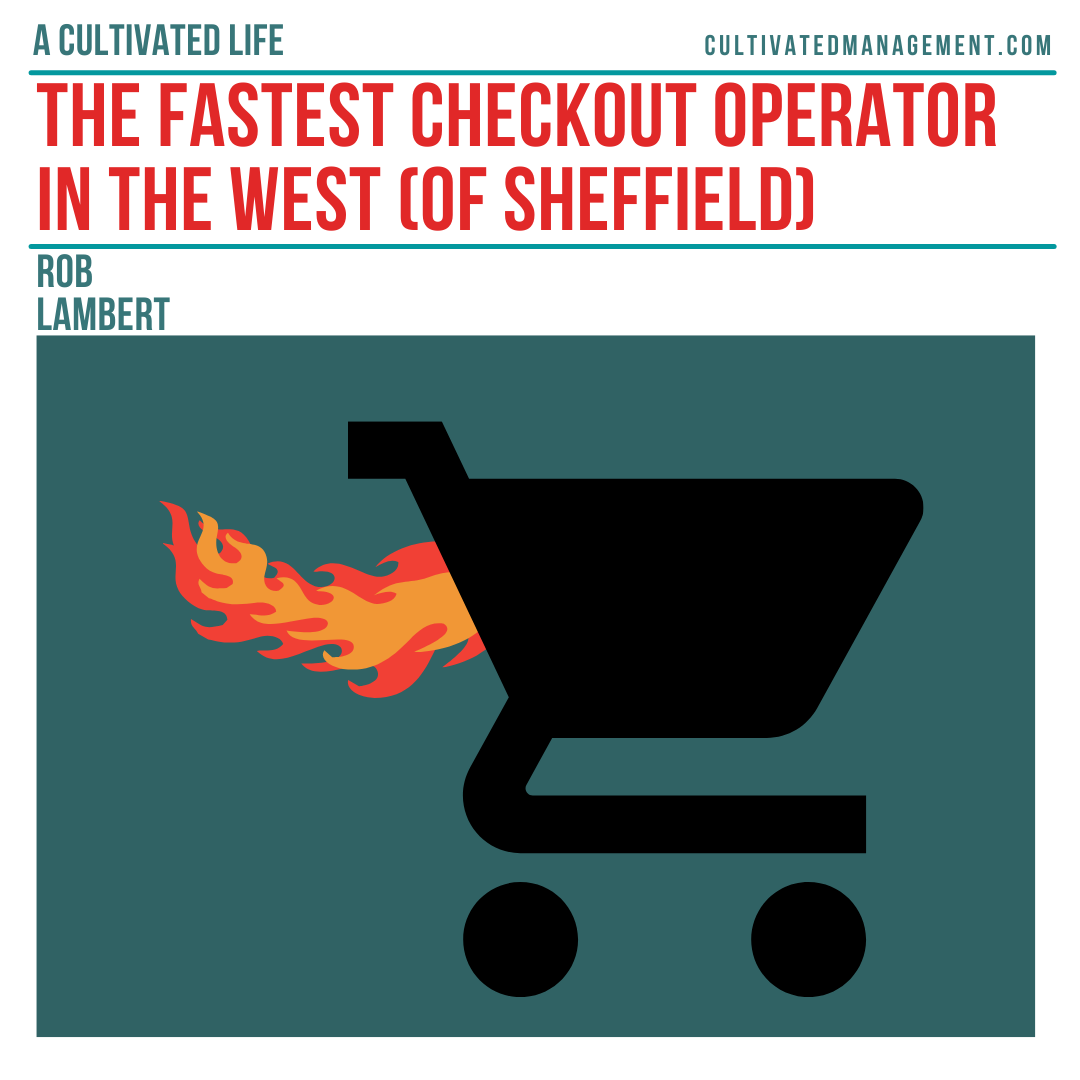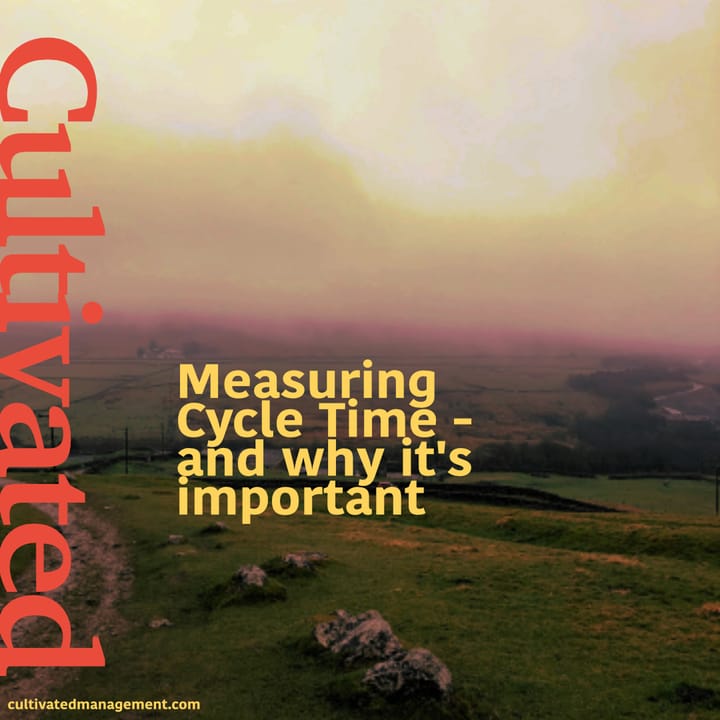Breaking Rules - The fastest checkout operator in the West (Of Sheffield)

Breaking Rules is not really in my DNA, yet there are some rules around our work that make no sense at all. There are plenty that do, regarding laws, decency, fair treatment and the like, but often there are rules about how work should work, that have no obvious reason to exist. I discovered these once when I worked in a supermarket. And I broke them. Naughty me.
Breaking Rules
The year is 1996. Brit-pop is all the rage. The weather is hot. Really hot. One of the hottest summers in British history and I’m sat in a baking hot canteen in the basement of a supermarket. It’s my lunch break.
Today, the hottest day of the year, I am at work. I’m so bored and hot. I’m barely awake.
15 minutes left until my next shift on the checkouts. I’ve yet to become the fastest checkout operator in the West (of Sheffield), but we’ll come to that in a minute.
As I drift in and out of consciousness my eyes catch sight of a thick booklet wedged down the side of the coffee machine. I grab it. It’s the operating manual for POS Terminal 4635522538838FES – FDEE.

In other words the manual for how to use the checkouts.
I’m bored. It’s hot. There’s nothing else to do. So I read it.
As I flick through the booklet, fate has me land on page 75. As I scan the page I see a one-liner.
“Depressing the subtotal function operator will cease all timings associated with measures and scales of usage”. The language is inaccessible. After some deciphering I realise it means that when I press the “Subtotal” button on the checkout, all of the timers stop.
Gold. Absolute Gold.
In this supermarket my only measure of effectiveness, as used by management, is how fast I can scan someone’s shopping through. And I’ve just learned that hitting subtotal stops my timers. Gold indeed.
In my 1 year here I’ve never won fastest checkout operator. I care too much about our customers for that prize. My goal is to make sure the customers are happy – so I focus on delivering great service which always slows down my scan rate. I get told I’m too slow, but the customers will purposely queue and wait for me. It’s my winning smile. That’s what I tell myself.
Customer Service
Customer service in retail is sometimes hard to measure, so very few companies do it, or they use the dreaded Net Promotor Score. A Secret Shopper here and there maybe, but they’re mostly looking out for canned phrases like “would you like help with your packing?” even though the customer only bought one item.
Customer service and satisfaction is not measured in this supermarket – only how fast I scan things. It’s assumed that the faster I scan, the more customers I “process” and the more cash hits the bottom line. This is success for this chain.
I’ve hit gold now though – I can focus on service AND stop the clock when I need to. I am breaking rules because I have the insights into how the rules are measured.
I burn the manual. No-one else needs to see this.
I’m a teenager on a mission to become the fastest checkout operator in the west of Sheffield. Yes, life was simpler back then; my goals were less ambitious.
I head upstairs and immediately start gaming the system.
Exactly one week later I am crowned the “fastest checkout operator” in the store. After 1 month this soon becomes the region’s fastest checkout operator. No prouder moment has ever befell a person from Yorkshire. After 2 months I become the fastest checkout operator the company has ever seen.
I feel guilty.
I could probably keep this title forever but I’m cheating. I’m breaking rules. I have an advantage. So, I share my secret with others. Everyone starts to become lightning fast – according to the measures. This insider knowledge ripples through the entire company.
I feel less guilty, but I’ve created another problem; management think productivity is through the roof – only the cash in the bank doesn’t reflect this new speediness.
Surely with faster throughput they should see more overall transactions, more stock being used, more cash?
- Speed = Productivity
- Productivity = Profit
Right? Nope.
Breaking Rules and Cheating
I cheated the system because I cared about customer service. I was breaking rules because I was measured on something that held little resemblance to what customer’s wanted.
In many organisations, from supermarkets to corporates, speed is often a prime driver and measure. “We must be faster”. “We have to become more productive”.
Speed is often assumed to equal productivity.
- “The faster we ship products the more productive we are”.
- “The faster we can onboard customers the better we are”
Not necessarily.
It’s entirely possible to ship awful products quickly. It’s entirely possible to ship fixes and corrections for mistakes quickly too. It’s entirely possible to offer poor customer service quickly. It’s entirely possible to rush customers into your business and do it badly.
Speed is easy to achieve. Speed with quality, accuracy and good service is not. It takes time, patience, relentless process improvement and more than “speed” as a single measure of effectiveness.
Speed is not productivity for many of us.
I was breaking rules because I wanted to offer the best service I could and keep management off my back. I wasn’t fast enough according to the measures. I therefore wasn’t as productive as others. I was therefore under-performing. Yet I did offer awesome service. I had people willing to queue longer just to be served my me. I had positive feedback every week in our customer feedback book (yes – it was that long ago that we used paper log books). I was delivering the service customer’s wanted.
But I wasn’t the fastest until I learned to cheat. I met managements objectives (and delivered outstanding service) by breaking rules.
Why did offering good service slow me down?
At this supermarket we were different. We packed your bags for you. We would scan the items and pack them and send the bags down a conveyor belt for you to collect and load into your trolley.
As such there were many bottlenecks with this approach. Each of these bottlenecks meant me, as a checkout operator, had to stop scanning and wait. As the clock kept running whilst I waited – I had long scan times. Other operators simply kept scanning and piling bags up, not chatting to customers and generally rushing people through. People don’t want to be rushed. They want speedy service but not so fast that they struggled to keep up.
Breaking rules and using the newly found Subtotal button allowed me to stop the clock when I hit a wait point.
The checkout loading belts were not very long, so sometimes customers had filled the belt with goods to buy, but not finishing emptying their trolley yet. This meant they couldn’t move to the other end of the checkout and empty the bags I’d packed.
- Those who focused solely on speed would keep stacking loaded bags on top of loaded bags. They would even pull bags out and stack them on top of the checkout. They would call for help and ask someone to empty them to the floor. All of which caused stress for the customer – they were rushing to unload and collect the packed bags. We called these stackages.
- Sometimes people would run off and get items they’d forgotten, holding up the entire process. We called these runnages.
- Sometimes spillages and damages would happen, meaning everything had to stop whilst it was cleaned up. We called these spillages.
- Sometimes people would interfere with your packing and demand a certain style of packing. We called these interferages.
- Sometimes goods would fall off the conveyor belt, meaning scanning would slow down or stop. We called these rollages.
- Sometimes you needed approval or a supervisor to do something. We called these helpages.
- Sometimes you’d encounter weird fruit and veg. This meant spinning a plastic wheel that listed all the fruit and veg alongside a special code to enter manually. Frankly, when I was 17 pretty much anything other than an apple and a Banana was weird. I became good at searching the wheel of weird fruit. Those that focused on speed would put everything through as a Kiwi (code 111 – the easiest to enter on the keypad). This would then cause all sorts of over stocking problems with Kiwifruit, which the store would then have to discount or throw away. We called these weirdages.
You get the point. At each of these waiting points the clock would keep ticking. Time was passing by. You could either offer good service and wait (and never hit your speed targets), do the wrong thing like entering incorrect fruit codes or stacking customer’s bags, or cheat using the subtotal button.
I had the golden subtotal button. I could stop the clock. I could offer good service. I could pay attention to the customer. I could still win the prize of “Fastest Checkout Operator”. I was breaking rules to achieve my targets. After I shared it, so too could everyone else.
Speed = profits was a simple calculation that informed and steered every single decision about how to manage and operate in this chain of stores. It was fundamentally the wrong metric.
When surveyed, customers would complain about being rattled through the checkouts like cattle and how miserable the employees were. The management didn’t know how to address this. Every strategy they thought of would reduce the speed of scanning – and this was not productive when measuring speed – just not good enough.
Good service was not possible when the only measure was speed.
They were stuck on the numbers that they felt reflected productivity – how fast people scan customers through. When single numbers of productivity become your world it can be hard to let go of them. It can be hard to see other ways to measure value. It can be hard to improve and experiment. Single numbers to measure success are rarely helpful. And they result in the people breaking rules.
Lessons learned
I learned a number of valuable lessons working in a supermarket for several years (by the way supermarkets are a lot of fun to work in) – that has helped me in my career in Management and HR. And of course by breaking rules along the way (breaking rules that don’t make sense anyway…nothing illegal done here)
- Supermarkets are the perfect environments to study flow. Flow of work, flow of stock, flow of unpredictable people, how to study bottlenecks and how to find areas of optimisation. In the business world I focus a lot on the flow of work – flow beats capacity every single time.
- Supermarkets are the perfect environments to see the constant struggle between efficiency management and customer service.
- People will always find a way to cheat to avoid getting into trouble. Fear is something we all naturally avoid. We will always find ways to avoid being told off.
- I learned that management by productivity numbers alone was almost totally pointless. Studying what actually happens in the day to day work (localised) and improving it (with related measures) is far more effective.
- I learned that customer service is the most important aspect of any business. Without the customer you have failed, no matter how fast or productive you are. If they don’t come back – you lose.
- Speed naturally comes from slowing down and making a process smooth. Slow is smooth, smooth is fast. (This played itself out in all aspects of the supermarket – I spent time working in each area and this principle was always true). Iron out a process and you become quicker. But to iron it out – you often have to slow down to study it and improve it.
- The approach of optimising flow and focussing everything on the customer is pretty much the same approach I’ve used to build teams. The principles of customer first, measure against purpose and optimise flow transcend many industries.
- People remember how you make them feel – a lesson from my communication workshop. If you make them feel like cattle, or just a piece of profit, they’ll remember that. People don’t like to feel bad, so they’ll go somewhere where they are valued – this is the same for employees as it is for customers.
- Metrics and measures are not bad – they are helpful for those doing the work. What drives the wrong behaviours are targets based on nothing more than a guess.
I loved working in the supermarket and I learned a lot. Even though I was breaking rules.
The most important lesson is that speed does not always equal productivity – at least not from the perspective of the customer.
It is likely that this same principle is true in your teams too.

